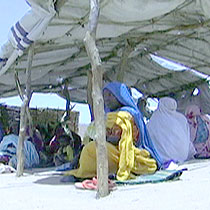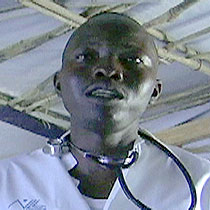2007年VOA标准英语-Chad's Violence Strains Health Clinics
时间:2019-02-03 作者:英语课 分类:2007年VOA标准英语(八月)
Dakar
06 August 2007
In eastern Chad, violence along the Sudanese border has forced more than 100,000 Chadians into camps. Clinics run by international agencies try to contain and treat diseases that circulate in often waste-infested tight living conditions. Phuong Tran visited a clinic 80 kilometers from the Sudanese border and reports on the difficulties in providing health care to those who need it.

Waiting for health care service
Too many people and too few health care staff mean only about 10 percent of Chadians fleeing violence have access to health care.
Patients wait in more than 40 degree (Celsius) dry heat to hear their names.
Badradina Abdoulaye enters the hot tent with her five-month-old baby. "My baby has been up all night with a fever and diarrhea," she says.
Bedeness Phares, a 32-year-old Chadian nurse, examines the still feverish 1 child and decides he has a respiratory illness. Phares writes in the woman's small yellow health booklet given to Chadians when they enter the camp.
The next patient arrives with uncontrollable itching 2. Describing the symptoms, the patient says, "My whole body feels like fire. I also have pains in my stomach."

Nurse Bedeness Phares
The nurse prescribes allergy 3 medication, and tells her to come back tomorrow if her stomach pain gets worse. He sends her home with her health booklet.
"People squeezed into the camps are exposed to so much that breathing, stomach and skin problems are common," Phares said.
Hours into the day, the nurse still faces a pile of health records for patients outside the clinic. The next one is an 18-year-old early into her pregnancy 4.
She tells him, "I suddenly started bleeding last night. I do not know what happened."
After a quick exam, nurse Phares says he wants the young woman to go immediately to the hospital. The patient expresses her difficulty, "I know it might be serious, but I cannot go to the hospital until I find someone to watch my two children at home."
The nurse lets her go, but he writes she needs more care. Like so many of his other patients, the nurse knows the young woman may not come back.
Before he can answer the walkie talkie announcing more patients in surrounding camps, the nurse must first get to the ones still waiting outside.
- He is too feverish to rest.他兴奋得安静不下来。
- They worked with feverish haste to finish the job.为了完成此事他们以狂热的速度工作着。
- The itching was almost more than he could stand. 他痒得几乎忍不住了。 来自《现代汉英综合大词典》
- My nose is itching. 我的鼻子发痒。 来自《简明英汉词典》
- He developed an allergy to pollen.他对花粉过敏。
- The patient had an allergy to penicillin.该患者对青霉素过敏。